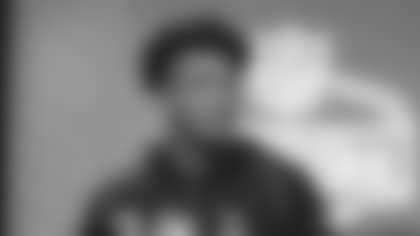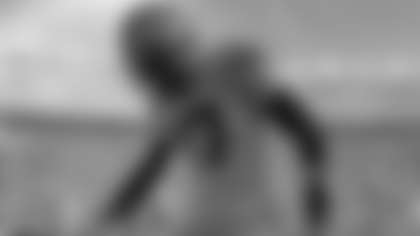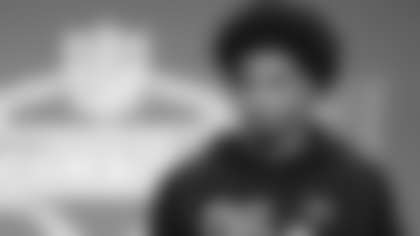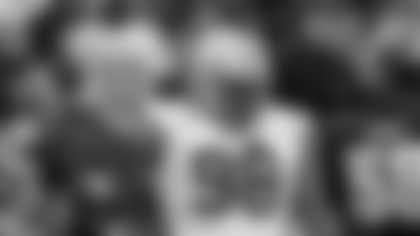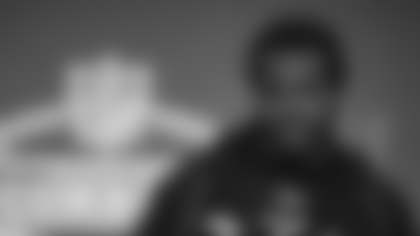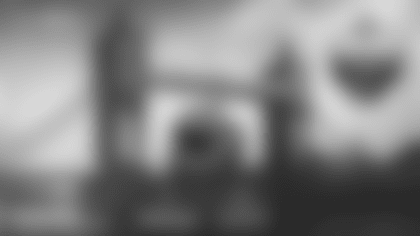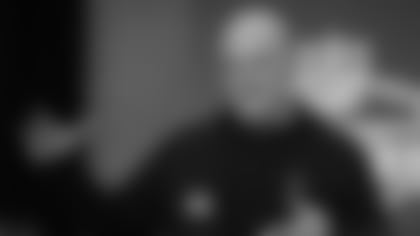Andrew Wylie was in the middle of his final season with the Kansas City Chiefs when he learned that his sister Allie was diagnosed with thyroid cancer.
"Very scary, and it was tough because I couldn't be there," Wylie said. "It was right around the time her and her husband were trying to get pregnant, too, which brought a whole other level of difficult."
Many members of the Wylie family have navigated thyroid struggles. Andrew, for example, has managed hyperthyroidism since high school. His sister, however, is the only one to have thyroid cancer. Thankfully, Allie was able to get the gland removed surgically, eliminating the cancer.
"She has two beautiful kids now -- a little niece and a nephew," the Commanders guard said. "Just extremely grateful we're all doing well over on the Wylie side."
Wylie isn't the only one on the Washington Commanders' roster whose family has been personally touched by the disease that impacts millions every year. Ahead of Washington's Crucial Catch game, players opened up about how cancer has made an appearance in their lives.
Wide receiver Jaylin Lane's family suffered a cancer loss when the Commanders rookie was around 4 years old. Bobby Lane, Jaylin's grandpa on his dad's side, died of a brain tumor when he was in his 50s.
"We were real young when it happened, so it was hard to understand what was going on," Lane said. "I only got to spend four years of my life with him, but I remember we used to play hide and go seek every time we went over to his house. Me and my brother, we loved going over to spend time with Pop Pop."
Since Bobby Lane's passing, every time the Lanes see a ladybug, they know that "Pop Pop" is with them. Now, Jaylin's father is a grandpa, and the young wide receiver sees that his dad has more awareness around staying on top of his health so he can be around as long as possible for his grandkids.
Washington tight end Ben Sinnott can relate to keeping an eye on health after a cancer diagnosis in the family. His mom, Tina, was diagnosed with breast cancer when he was a kid.
"She felt a lump, and I think she got it looked at right away," the second-year Commander recalled. "She caught it at stage 2, so fairly early. I don't know how long she did chemo, but she lost her hair and that was crazy for me at such a young age to understand."
Sinnott has "vivid memories" of sitting with his mom through chemo and how, even though she was in pain, she "was really strong about it and made [him] feel like everything was going to be okay."
After some time, Tina was declared cancer-free.
"I remember when her hair was growing back. I was happy for her that she had that," Sinnott said. "It was a tough time for me and my family, and it was cool to see her get through it."
Tina still deals with some health complications related to her cancer fight, and the experience has left an indelible impact on her son.
"It was a life saver to catch it that early," Sinnott said. "I know a lot of people shake off a symptom, but it's important to be able to make sure. Anything my family has, my wife, anything that even gives them the slightest clue, I tell them to go get it checked out."
This approach and message are exactly what Crucial Catch aims to emphasize each year. Early detection saves lives.
"If you think you have something that's bothersome, go get it checked out," Wylie similarly emphasized. "You can get great peace of mind from that if it's nothing. And even if it's not, you don't want to live in denial."





